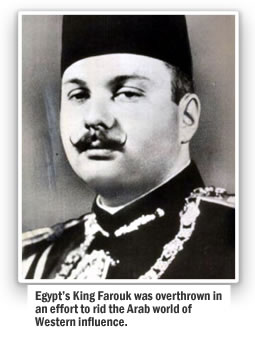

Information Related to "A Rising Tide of Arab Nationalism"
 | Audio/Video |
One of the most significant developments in the region following the Treaty of Versailles ending World War I was rising Arab nationalism.
Frustrated at the betrayal by the European powers, Iraqis rebelled against their British rulers. The British soon regretted their involvement in Iraq, which cost them a great deal of money for little or no return. At a time when they were already financially weakened after fighting World War I for more than four years, they now found themselves forced to try to keep the peace in a hostile region.
The establishment of the independent Jewish homeland was also of great significance. There is no doubt that the history of the Middle East following World War II would have been completely different had Israel not been created. It was difficult enough for Arabs to accept European domination of parts of the Arab world, but now they were faced with what they considered a colony of infidel Westerners who intended to live permanently on Arab land.
Initially Arabs didn't blame the West for Israel's existence. In the early days of the Jewish state, the communist countries of Eastern Europe played a vital role in ensuring the people had arms with which to fight the Arab armies. Because many Israelis lived a communal existence on collectivist farms called kibbutzim, the Soviet-bloc countries thought that Israel would be a foothold for them in the Middle East, a region still under the domination of the European imperial powers at the time.
Later, American Jews would be instrumental in securing American backing for what is also the only Western-style democracy in the region. The Soviets meanwhile found another possible foothold in the area.
 Frustrated at their defeat in the 1948 war to destroy Israel and angry at the corruption of their Westernized ruler, King Farouk, Egyptian army officers overthrew the monarchy in 1952, establishing a revolutionary republic in Egypt that inspired others throughout the region. The dream of Arab unity seemed about to be realized.
Frustrated at their defeat in the 1948 war to destroy Israel and angry at the corruption of their Westernized ruler, King Farouk, Egyptian army officers overthrew the monarchy in 1952, establishing a revolutionary republic in Egypt that inspired others throughout the region. The dream of Arab unity seemed about to be realized.
The radical new leadership of Gamal Abdel Nasser inspired Egyptians and all Arabs to throw out Western influence. Nasser nationalized the British- and French-owned Suez Canal, leading to a British-French-Israeli military mission to recover the Canal and overthrow the radical Arab government that threatened Western and Israeli interests. But the Eisenhower administration, fearful of increased Soviet influence in the region, forced the allies to withdraw. The Soviets got in anyway, supporting Egypt and other Arab nations against Israel for the next 25 years. Washington and Moscow were now heavily involved in the region.
After Egypt, it was Iraq's turn to overthrow its pro-Western monarchy. It should be noted that the kings and other hereditary rulers of the Arab world are usually educated in the Western world, mostly Britain and the United States, so they tend to be pro-Western. More importantly, they are also often Westernized, which irks their more religious subjects.
In 1932 the British had left Iraq with an established governmental system, a constitutional monarchy with an elected assembly, along British lines. Neither survived very long after the British left. The military, important under the Ottomans, took over in 1958 in a bloody coup in which the Hashemite King Faisal and most members of the royal family were killed. Constitutional government has not been successful in the Arab world and has had little success elsewhere among Muslims.
Eventually Iraq came under the domination of Saddam Hussein's dictatorship. Similarly, King Idris of Libya was overthrown in 1969 and replaced by the radical anti-Western leader, Colonel Muammar Gadhafi. As monarchies were overthrown, the successor republics became dictatorships. Syria has even become a dynastic republic with the son of the previous president taking over after his death. This will likely be copied in other Arab countries. It was certainly the intent in Iraq before the 2003 Gulf War that led to the downfall of Saddam Hussein.
In 1958 Egypt, Syria, Yemen and the United Arab States formed the United Arab Republic, an attempt at Arab unity that did not last, continuing only until 1961. But the desire for unity remained.
 One reason behind this persistent goal was the wish to be able to more effectively oppose Israel militarily. The Jewish state achieved yet another military victory in the 1967 Six-Day War. Provoked by Arab armies, Israel fought a rapid war that led to her gaining control of the West Bank (taken by Jordan in the 1948 war), the Golan Heights (formerly owned by Syria) and the Gaza Strip (seized by Egypt in the 1948 war). Additionally, for the first time since the diaspora, the Jews had control of Jerusalem.
One reason behind this persistent goal was the wish to be able to more effectively oppose Israel militarily. The Jewish state achieved yet another military victory in the 1967 Six-Day War. Provoked by Arab armies, Israel fought a rapid war that led to her gaining control of the West Bank (taken by Jordan in the 1948 war), the Golan Heights (formerly owned by Syria) and the Gaza Strip (seized by Egypt in the 1948 war). Additionally, for the first time since the diaspora, the Jews had control of Jerusalem.
Further victory followed in the longer October War of 1973, often called the Yom Kippur War as it started with a multinational Arab attack on the Day of Atonement, the Jews' holiest day of the year. Between these wars Palestinian terrorism began, and after the 1973 war the Arab world first used the oil weapon to put pressure on the West, quadrupling the price of oil and destabilizing the world economy.
All these defeats only further convinced the Arabs of the need for unity, which continued to eluded them. Today most of the countries in the region are led either by conservative Muslim monarchies or radical and despotic nationalists. Though in some ways these forms of governments are opposites, both maintain an iron grip on power over their people.
In this cauldron of nationalism, resentment toward the West, hatred of Israel and frustration among citizens with their own governments and leaders, an ancient force has reemerged to bring terrorism and grave concern to the heart of the West-Islamic fundamentalism.
©1995-2022 United Church of God, an International AssociationRelated Information:
Sidebar to The Creation of the Modern Middle East
Origin of article "A Rising Tide of Arab Nationalism"
Keywords: Middle East, history of the Arab nationalism Israel, modern
Arabs: